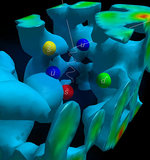Leap towards Holy Grail of particle physics
 Science Science
Particle physicists around the world are designing the next generation of billion-dollar experiments following new findings from a University of Adelaide-led research team. The Holy Grail of the world's particle physicists is to discover and describe new particles that make up the universe's tiniest building blocks. The University of Adelaide's Associate Professor Derek Leinweber, leading a team of international theoretical physicists, has established a new approach to precision calculations, vital to establishing what is known and paving the way to revealing the unknown. The proton, one of the three main components of an atom, is known to consist of elementary, point-like particles called quarks, bound together by gluons. There are six different types of quarks and the most mysterious of these is the strange quark, which "boils up" inside the proton and then "simmers back out of existence". The new finding, published recently in the prestigious international journal Physical Review Letters, is a precise calculation of the strange quark's distribution within the proton. The calculation predicts that the short-lived strange quarks display an unanticipated level of symmetry in their journey. "Technically the strange quark contribution to the proton's charge distribution has proven elusive," said Dr Leinweber. "At the University of Adelaide, working with physicists at the University of Edinburgh and the Thomas Jefferson National Accelerator Facility in the United States, we've been able to calculate the strange contribution with unprecedented accuracy by applying a unique combination of cutting-edge numerical and analytical approaches. "We have combined expertise in fundamental Lattice Simulations on supercomputers together with breakthrough techniques in Effective Field Theory calculations. These are two separate areas of physics which have been used together in a way that no-one else has thought of. It gives particular strength to the University of Adelaide's research in this area. "There is a huge industry in particle physics with groups of researchers around the world making new measurements that could reveal physics beyond the standard model of the universe. Our result presents a huge challenge to experimental physicists in planning the next generation of experiments. Billions of dollars are going to be spent, based on this result." Dr Leinweber is Deputy Director of the University's Special Research Centre for the Subatomic Structure of Matter, based within the School of Chemistry and Physics. He is also Deputy Director (Visualization) of the South Australian Partnership for Advanced Computing (SAPAC) which serves South Australia's e-research needs. His research relies on the application of a complex theory called quantum chromodynamics and makes use of the massive computing power of the world's fastest supercomputers. Last year the group produced a precise calculation of the strange quark's contribution to the proton's magnetism. This latest theoretical result already has been supported by new experimental results recently announced by the Jefferson Laboratory's HAPPEx Collaboration. Story by Robyn Mills
|





